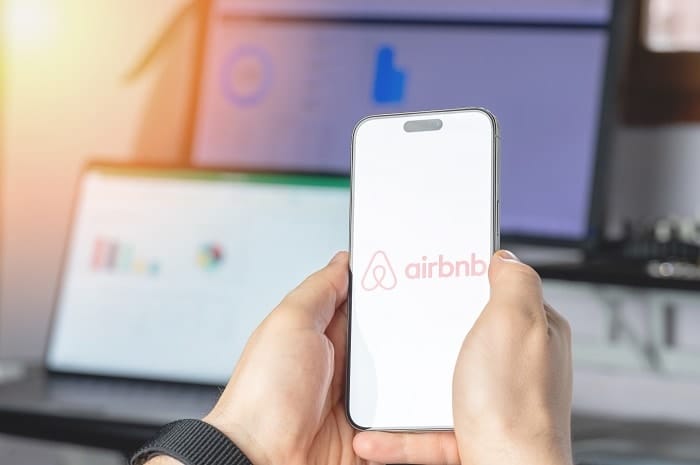Airbnb Market Share and the Top Competitors Shaping the Rental Market

Airbnb continues to dominate the vacation rental market, but competition is rising with platforms like Vrbo and Booking.com. We dive into Airbnb’s market share, its biggest competitors, and the evolving landscape of vacation rentals. Whether you're a host or investor, discover how these changes are shaping the industry and what it means for your rental business.
Some argue that the era of explosive growth in vacation rentals is over. Others say today’s vacation rental landscape is highly competitive for investors and hosts. Yet, Airbnb continues to grow.
Let’s investigate the reality behind the hype and address some key questions:
Where is the vacation rental industry heading? Will Airbnb continue to hold the lion’s share of the market in the future? Is listing properties on Airbnb alone enough to make a substantial profit?
Over the past decade, Airbnb has made significant strides and has dominated the U.S. market. Let’s explore the situation in the U.S. and other markets around the globe to see how Airbnb stacks up against its top competitors.
Airbnb Statistics and Industry Trends You Should Know About
The U.S. vacation rental market size was estimated at $17.47 billion in 2023. However, the projected growth at a compound annual growth rate of 2.9% by 2030 shows no signs of slowing down, according to Grand View Research.
Airbnb reports consistently higher revenue figures. In Q1 2024, Airbnb's revenue reached the historic figure of $2.1 billion. In Q2 $2.75 billion, up 11% year-over-year. From 72.4 million nights and experiences booked to a whopping 448 million nights and experiences in 2023, it’s clear that this company has reached a level that is very hard, if not impossible, to catch up with.
And they’re not planning to stop here. Chesky, Airbnb’s CEO, said he’s planning to expand geographically and as a brand by launching two or three new lines of business each year.
In the winter release of 2024, they plan to launch a marketplace that connects people who have homes for rent but no time to manage them with people who don’t have homes but would like to be hosts.
In May 2025, the company will also relaunch the updated and improved Airbnb Experiences.
The expansion of short-term rentals has also prompted traditional hotel chains to jump into the game and claim a piece of the market share. In 2019, the Marriott hotel chain launched Marriott Homes & Villas to provide premium and luxury home rental options to its Marriott Bonvoy members.
Vacation rental space is dynamic, changing, and adapting along with evolving travelers’ habits. Personalized experiences remain the top priority for those who want to excel, further supported and shaped by AI trends.
Despite the economic slowdown, the demand for luxury accommodations, unique stays, and out-of-the-box rentals remains high. Whether you’re catering to solo or eco-conscious tourists, the magic words are “custom experience” and “slow travel.”
What does this mean exactly?
Airbnb reports that 17% of its bookings are now stays of 30 days or more, not only because work and leisure are mingling but also because a new type of traveler wants to spend time living like a local and connecting with the place they’re staying at.
What Percent of Market Share Does Airbnb Have?
Airbnb's active listings reached over 7.7 million by late 2023, solidifying its position as the dominant player in the U.S. and North American markets. Thanks to the strong Airbnb brand recognition, reserving a nightly stay on Airbnb feels like a no-brainer for a wide range of guests.
Airbnb’s market share in the U.S. vacation rental industry is estimated to be around 17% (Business of Apps). It's estimated that 52% of global vacation rental inventory is listed exclusively on this platform.
Focused exclusively on shared or private rooms, apartments, and houses, including unique stays like treehouses and tiny homes, Airbnb has truly carved out its niche.
Airbnb by Region
Because Airbnb has strong brand recognition and is a dominant player in North America, it's easy to lose sight of the fact that around the world, there are places where competition is pretty fierce.
Nonetheless, Airbnb has managed to get its foot in the door in many markets—some emerging, and others quite mature.
If we break it down region by region, it looks like this:
North America
This region accounts for 46% of total revenue, which is around $4.64 billion in 2023. The U.S. and Canada are undoubtedly the biggest markets for Airbnb to date.
Europe, Middle East, and Africa
These regions account for $3.62 billion, or 36.49% of total revenue. Europe remains a strong market for Airbnb, though it varies by country. In many places in Europe, Booking.com holds a significant share of the market, often because consumers are more familiar with and accustomed to using this platform.
Asia-Pacific
Australia ranks 10th globally in the number of vacation rental listings. It’s a highly attractive tourist destination, attracting many visitors from the other side of the world.
Japan, one of the emerging markets, is an area where Airbnb has expressed interest in dedicating more attention and resources in the future. Asia-Pacific region currently generates 8.47% of the total revenue.
Latin America
Latin America is a market where Airbnb has been experiencing steady growth year after year. It currently accounts for approximately 8.27% of Airbnb’s total revenue, and this figure is increasing at a reasonable rate.

Airbnb Market Share Compared to Major Competitors
Who are Airbnb's biggest competitors in the vacation rental space? Let's break them down and see how they compare to Airbnb.
Airbnb vs. Vrbo
Vrbo has over 2 million listings and averaged 17.5 million unique visitors in 2023. Most users are in the U.S., and interestingly, in terms of demographics women use Vrbo slightly more than men (62% female to 38% male users). Vrbo is actually one of Expedia's subsidiaries, as the Expedia Group acquired Vrbo in 2015.
While both platforms cater to short-term rental guests, Vrbo focuses on renting out entire properties like houses. It's the go-to platform for people in groups, families, or those seeking luxury properties like villas. Unlike Airbnb, you can't rent out shared spaces on Vrbo.
Compared to Airbnb's 52% exclusive global vacation rental inventory, Vrbo has 8% unique global listings.
Both platforms have similar features and allow you to book monthly and longer stays, in addition to short-term rentals. Many listings on Vrbo are managed by professional property managers and, on average, have a longer lead time.
Airbnb vs. Expedia
Expedia isn’t exclusively a platform for vacation rental seekers. It offers a wide range of services, including flights, car rentals, accommodations, cruises, activities, and bundle packages.
Nevertheless, it provides over 2 million alternative lodging options in 70+ countries (including vacation rentals, but not limited to them). Their $12.18 billion revenue in 2023 demonstrates that they’re turning a significant profit.
Expedia is popular among tourists seeking bundled travel options, offering the convenience of booking multiple services at once, such as flights, car rentals, and lodging.
For individual hosts, Airbnb makes more sense due to its flexible fee structures and cancellation policies.
However, you might consider listing your property on some of Expedia’s subsidiaries, like Vrbo, or on Expedia itself, to reach a broader audience. Keep in mind that on Expedia, you’ll be competing directly with hotels.
Airbnb vs. Booking.com
Like Expedia group, Booking.com surpasses Airbnb in terms of market cap. Originally focused on hotel listings, they've since expanded their offerings to include rental cars, airport taxis, flights, and alternative accommodations.
Recently, they've been making a stronger push into the vacation rental market, even featuring unique stays - a category Airbnb is famous for.
With over 28 million accommodation listings, Booking.com generated $21.3 billion in revenue in 2023.
While U.S. tourists may be less familiar with Booking (which now invests more in advertising and brand recognition in North America). In other parts of the world, particularly Europe, they're the go-to app for accommodations.
This is partly due to their origins (an Amsterdam-based company) and the fact that travelers in many European countries are accustomed to using the app. According to Statista, Booking.com holds 70% of the hotel market share in Europe.
Airbnb vs. FlipKey
FlipKey was founded in 2007 as a house-swapping platform and vacation rental website. Acquired by TripAdvisor in 2008, it has since become part of TripAdvisor Rentals, which lists over 830,000 properties worldwide.
However, FlipKey never grew in the way Airbnb did. FlipKey alone has just around 300,000 listings—not even close to Airbnb's 7.7 million active listings.
FlipKey has a presence in 190 countries like the United States, Germany, Australia, Turkey, and France, and connects you with other TripAdvisor services.
Airbnb vs. Google Vacation Rentals
If you're a vacation rental host, you can list your property on Google Vacation Rentals. This platform acts as a meta-search engine, displaying your direct booking website on Google Search, Maps, and Google Travel. Google Vacation Rentals is part of the broader Google ecosystem.
Using this platform is a great way to boost your property's visibility and secure reservations without paying a fee per booking to an OTA.
If you create your direct booking website with iGMS, you can list your properties on Google Vacation Rentals with just one click.
Local and Regional Competitors in Key Markets
Beyond global platforms, local websites and apps offer hosts additional revenue streams:
FeWo-direkt is recognized as Germany's leading vacation rental marketplace, focusing on family-oriented accommodations.
Stayz primarily operates in Australia but has an international presence with over 2 million homes worldwide.
Owner Direct, with its largest market in North America, connects tourists directly with property owners, facilitating bookings without intermediaries.
IGMS, as your property management system, automatically connects you to these and other major booking platforms through its channel manager.
High-End Booking Platforms
Luxury booking websites specialize in renting high-end homes and villas. For example, Marriott Homes & Villas offers a curated collection of premium and luxury vacation rentals, catering to existing customers and guests of their hotels.
Increasing Competition in the Vacation Rental Industry
Over the years, the vacation rental business has become increasingly competitive. While the number of total nights booked has risen dramatically, there are now more hosts and investors in the short-term rental game than ever before.
It’s tempting to assume that the growing number of Airbnb listings creates a zero-sum game, where we might end up slashing prices just to secure each Airbnb booking. But that's not typically how things play out.
When demand is strong, competition is actually a positive sign. It presents an opportunity for new hosts to enter the same market and stand out.
Sure, some local markets may become oversaturated, but the beauty of the short-term rental model is that there's always an emerging market somewhere, just waiting for a savvy investor to spot the opportunity.
Airbnb pricing is a part of your branding strategy. Hosts can set themselves apart by offering unique amenities and top-notch service.
Growth is not limited to Airbnb. Other booking platforms are seeing significant growth too. Take Vrbo, for instance—they've tripled their revenue since 2016. Vrbo’s revenue jumped from $1.22 billion to $3.3 billion in 2023.
How Regulatory Challenges Impact Vacation Rental Business in Metropolitan Areas?
Property owners renting out on the Airbnb platform face stricter restrictions and rules regarding short-term rental accommodations in urban areas. This is because many cities have implemented regulations to address concerns about housing availability and noise issues.
These regulations do not necessarily ban Airbnb listings; rather, they limit the number of rental days, impose licensing requirements, and require adherence to zoning laws.
Is Inflation Slowing Down Airbnb Growth?
Despite the economic slowdown and inflation, the travel industry has shown remarkable resilience, continuing to drive vacation rental and Airbnb growth in the next few years. Consumers are prioritizing travel experiences, even in the face of rising costs.

Why Does Listing a Property on Multiple Platforms Give Airbnb Hosts a Competitive Advantage?
The highest percentage of successful hosts and real estate investors never put all their eggs in one basket.
Even though Airbnb is the industry leader, it's wise to diversify income streams and ensure bookings are made through different channels.
Firstly, you don't own the booking platform, so you're dependent on their algorithms.
Secondly, whenever possible, it's a good idea to avoid paying fees to OTAs, which can range from as low as 3% to as high as 14% (even 16%).
If you connect your listings with the iGMS channel manager, you won't have to worry about double bookings ever again. iGMS integrates with major booking platforms such as Airbnb, Booking.com, Vrbo, Google Vacation Rentals, and popular local websites.
We also create direct booking websites to drive direct bookings and connect them to Google Vacation Rentals, allowing you to avoid booking fees altogether.
About the Author
Zorica Milinkovic is a B2B SaaS writer who is passionate about psychology, marketing, and, when inspiration strikes, cooking. You can find her on LinkedIn.







